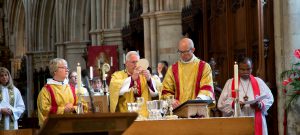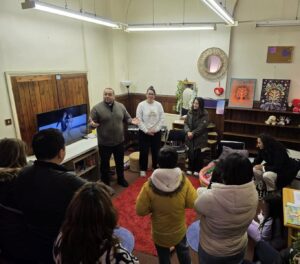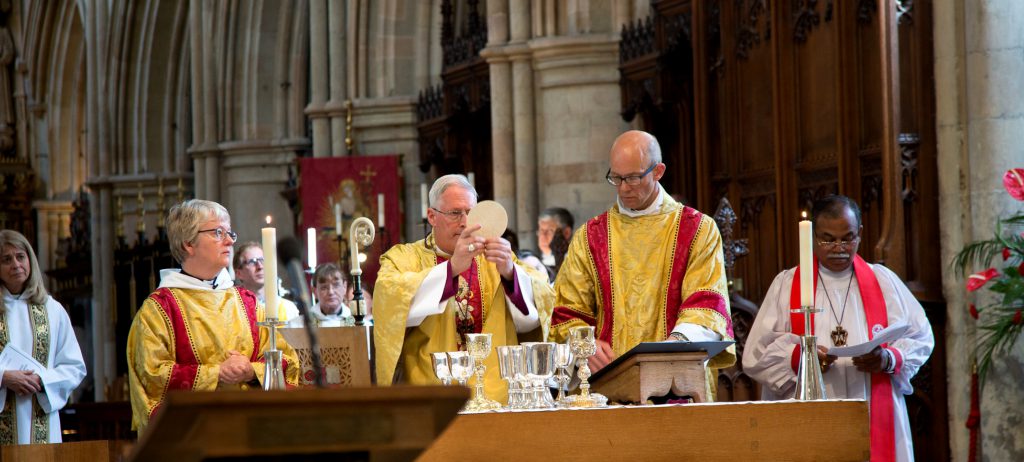This weekend the Church and her pilgrim people pause on the journey through Lent for refreshment along the way and this is reflected with Mothering Sunday, the Fourth Sunday of Lent, also known as Laetare Sunday. The day gets it name from a chant taken from the glorious final chapter of Isaiah: ‘Rejoice with Jerusalem, and be glad for her’ (Isaiah 66. 10).
Earlier in Isaiah we are given another beautiful vision of redemption, which I would like to consider today: “Surely God is my salvation; I will trust, and will not be afraid. […] With joy you will draw water from the wells of salvation” (Isaiah 12. 2, 3).
I am always humbled by the generosity of God to us. The Parable of the Prodigal Son might easily be renamed the parable of the prodigal father, so unstinting and exuberant is the father’s response to the return of his child who had lost his way and squandered his birthright and yet was still held lovingly in his father’s heart. It is easy, particularly if our journey of faith has been a long one, to forget that God’s generosity remains for us, as much as it is always there for others. We can lose sight of what originally warmed our hearts in our coming to faith, what attracted us to Christ in the first instance. Following the year just gone and all that has happened in its wake, a certain crotchety weariness stalks the land – and as the Church charts its way forward, with all the opportunities and challenges that lie ahead for the proclamation of the Gospel and the service of God’s people, we need to ask ourselves just how shall we encounter again the generosity of God?
The pandemic has required people to respond in new ways to an entirely new situation. Despite the challenges and the failures, our common resourcefulness has been remarkable: nationally, the vaccination programme exemplifies this, as have all the local programmes of community relief across the three lockdowns, not least in the reaching out in each of our parishes with God’s love to the lonely and isolated, those who hunger and those suffering in body, mind and spirit. The cost of facing isolation, suffering, and grief, has taken its toll in different ways with many feeling their usual well is running dry. This, I think, is where Isaiah has something to encourage us; for the Prophet does not just refer only to one, single well of salvation, but to many “wells of salvation”.
There is only one source of living water – the Lord God. The Prophet Jeremiah describes the Lord himself as the “fountain of living water” (Jeremiah 17. 13) and Jesus promises the water that he gives “will become … a spring of water gushing up to eternal life” (John 4. 13). But God in his generosity and mercy gives us many wells on which to draw.
So, brothers and sisters, we may be sure that if the well we usually rely on has run rather dry this last year, it is not because there is no water. We need only to discover one of the other wells that the Lord has graciously prepared. The wilderness can be a place of real growth, of strengthening and proving, which is why another part of Isaiah describes redemption something that causes “waters” to “break forth in the wilderness, and streams in the desert; the burning sand shall become a pool, and the thirsty ground springs of water” (Isaiah 35. 6-7).
If your prayer has become dry and it is your custom to pray extempore, why not try some liturgical prayer? Or if your liturgical prayer feels routine, possibly even somewhat tedious, why not go for a walk and talk to your Heavenly Father as if he were walking alongside you as indeed the two disciples experienced in their encounter of the first Easter Day with the apparent stranger who was none other than the risen Lord? Or if words themselves are the problem, why not pray in silence, or with an icon? Should the Holy Scriptures need refreshing in your life, give time to Lectio Divina which simply dwells on each word and phrase of a passage in the Bible giving time for the Holy Spirit to speak to us, to still us, to centre us. And, if even that practice has become stale, turn to a commentary and set yourself to study, to read, mark and inwardly digest the Word. And do not forget that even beyond words in God’s good time and in the right place the Word became flesh and came to dwell among us, full of grace and truth. The wells our Lord has given us to drink from are many and deep. If this year has given us an opportunity to see the variety of what is available, we have something to be thankful for.
One thing we have to be thankful for in particular is the work that has been accomplished in honouring all God’s people in this place. I am very grateful for the work of the Archdeacon of Croydon and the members of Diocesan Minority Ethnic Anglican Concerns Committee in bringing together the work undertaken over many years in the Southwark Anti Racism Charter that is brought before Synod today. In so many ways, not least in this good endeavour, we have made much progress in Southwark but part of what has been accomplished is a deep realisation that this is ongoing work in progress. We shall ask the Lord to breathe his Spirit into our life and journey together, so that this is also the beginning of much more.
When Archbishop Rowan Williams presented his Charge to me at the Confirmation of my Election as Diocesan Bishop in January 2011, he applied his deep wisdom to what had been fed back from a diocesan wide consultation during the Vacancy in See. For ease of communication I focused on three dimensions: Renewal of Vocations, Lay Empowerment and Breathing new life into our Deaneries and on each of these we have indeed kept our focus.
Priorities included “building community cohesion and in bringing its message of social justice” by shaping a church that was a “credible partner with secular authorities”. Also the specific charge to “ensure that black and ethnic minority people are involved in every aspect of diocesan life”.
I wish this morning to share the full Charge with you, not in any sense to blow trumpets or tick boxes but just to give thanks for the wisdom of a process which, thanks to God’s grace and abundant generosity, has borne fruit in our common life together, though I leave it to others to judge this for themselves.
To Our well beloved brother in Christ, Christopher Thomas James Chessun, now Bishop and Pastor of the Diocese of Southwark, Greeting.
Recalling the mission entrusted by Christ to His Church to announce God’s kingdom and to make disciples, I now set before you the key tasks identified for you by those who have been concerned with your appointment, to guide you as you prepare to take your new office and ministry
To lead the Church in exercising its ministry of building community cohesion and in bringing its message of social justice in South London and Surrey; to shape the church to be credible partner with secular authorities at parish, borough and diocesan level; to build effective personal relationships with significant players in the developing social and community agenda and to identify opportunities for church and gospel contribution.
To promote the flourishing of the senior team to support mission and ministry across the whole diocese and to be their enabler, pastor and inspirer; to develop the corporate life of the team and to stitch together the different experience of individuals and the diverse needs of the different Areas to draw members to a common vision and a common purpose.
To develop a framework for ministry, encouraging lay ministry in all its forms and ensuring that clergy are equipped and cared for; to give confidence to all in their faith and ministries through your teaching ministry; to mobilize the gifts of the whole people of God in the service of the mission of the church and to encourage wide participation in governance and decision making structures of the diocese; to ensure that black and ethnic minority people are involved in every aspect of diocesan life.
To renew commitment to evangelism across the diocese and to provide leadership and direction in mission; to take the gospel to mission margins – to communities which are socially and economically alienated from mainstream society and church; to engage with majority and minority ethnic congregations and to lead the diocesan response to the mission possibilities these churches bring.
To promote the cohesiveness of the diocese and to encourage clergy and laity to engage with one another across respective expressions of Anglican faith; to nurture and value the gifts of all in the service of the mission of the church embracing the openness the diocese has to different traditions and different perspectives.
To participate in the leadership of the national corporate life of the Church and in the Nation; to work with fellow Bishops to frame the life of the whole Church and Nation within the Good News of Jesus Christ.
So, may Almighty God, who gives you the will to undertake these things, give you also the strength to perform them; and may His Grace and Blessing be upon you and upon all you seek to do in His Name, now and evermore.
+Rowan Cantuar
Lord Archbishop of Canterbury
Last Sunday was the tenth anniversary of my enthronement in the Cathedral, for which I give thanks to God for the opportunity to serve the people and parishes of South London and East Surrey. This anniversary presents as good an opportunity as any to reflect on the Charge I was given. The Charge was given to me – but no Diocesan Bishop can achieve what has been asked of him or her alone. What has been accomplished, we have done together; what remains for us to do, we shall need to do together.
I am grateful for each of you and pray that you, and every member of the diocesan family, will draw water with joy from the wells of salvation – but that we shall become refreshing wells of salvation for each other, and for the communities we serve, by offering the living water that is the Lord himself. For surely God is our salvation. We will trust, and will not be afraid.










